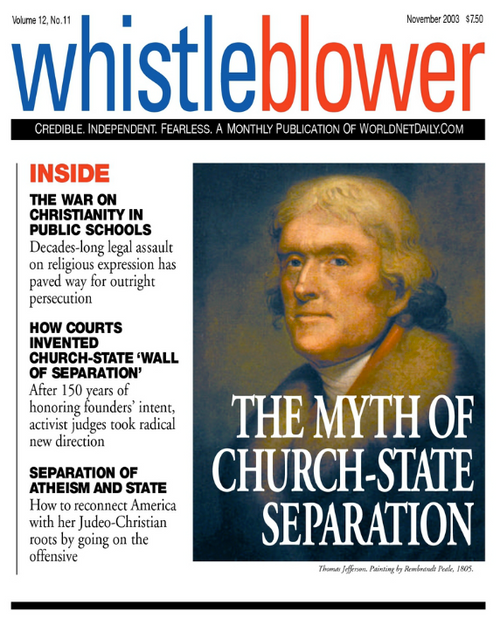November 2003: THE MYTH OF CHURCH-STATE SEPARATION
- In Texas, a U.S. District judge decreed that any student uttering the word "Jesus" at his school's graduation would be arrested and locked up. "And make no mistake," announced Judge Samuel B. Kent, "the court is going to have a United States marshal in attendance at the graduation. If any student offends this court, that student will be summarily arrested and will face up to six months incarceration in the Galveston County Jail for contempt of court."
- In Missouri, when 4th-grader Raymond Raines bowed his head in prayer before his lunch in the cafeteria of Waring Elementary School in St. Louis, his teacher allegedly ordered him out of his seat, in full view of other students present, and sent him to the principal's office. After his third such prayer "offense," little Raymond was segregated him from his classmates, ridiculed for his religious beliefs, and given one week's detention.
- In New York, kindergartner Kayla Broadus recited the familiar and beloved prayer -- "God is great, God is good. Thank you, God, for my food", while holding hands with two students seated next to her at her snack table at her Saratoga Springs school early last year. But she was silenced and scolded by her teacher, who reported the infraction to the school's lawyer, Gregg T. Johnson, who concluded that Kayla's behavior was indeed a violation of the "separation of church and state."
"The constitutional separation of church and state", a reference to the First Amendment in the Bill of Rights -- is a phrase Americans hear literally every day from the news media, from legal organizations, from politicians and pundits, and especially from zealous attorneys and judges.
"Separation of church and state" was used by the ACLU to demand that a banner proclaiming "God bless America," erected outside a school shortly after Sept. 11, 2001, to honor the 3,000 murdered Americans, must be taken down.
"Separation of church and state" was used to deny a little, handicapped girl the right to read her Bible on the bus on the long trip to school.
"Separation of church and state" was used to take Justice Roy Moore's 10 Commandments monument out of the Alabama Judicial Building, and it is being used right now to challenge the words "under God" in the Pledge of Allegiance.
The phrase is repeated so often and with such assurance, one would think it is the keystone phrase of the U.S. Constitution.
And yet -- the words "separation," "church," or "state" are not found in the First Amendment, nor in any other founding document for that matter.
In fact, the entire "constitutional separation of church and state" is a recent fabrication of activist judges who have ignored the Constitution's clear meaning.
Indeed, says U.S. Supreme Court Chief Justice William Rehnquist, in the stunning November issue of WND's Whistleblower magazine, "There is simply no historical foundation for the proposition that the Framers intended to build the 'wall of separation' [between church and state]."
Titled "THE MYTH OF CHURCH-STATE SEPARATION," this special edition, says WND Editor Joseph Farah, is "a definitive, once-and-for-all, legal and historical refutation of the fiction that the Constitution was intended to prohibit or infringe on freedom of religious expression, whether at home, church, school, or in the public square."
"It's a myth," said Farah, "and this issue of Whistleblower slam-dunks the case proving that's all it is."
Starting with the famous 1801 letter written by the Baptists of Danbury, Conn., to newly elected President Thomas Jefferson, and Jefferson's brief response, in which he coined the phrase "a wall of separation between church and state" to assure his constituents that the new Constitution would not establish a national church or otherwise infringe on their religious liberties, this special Whistleblower edition attacks the church-state issue from every conceivable angle.
Contents include:
- An overview of the church-state debate by Joseph Farah
- "How courts invented church-state 'wall of separation'" by David Barton, showing how, after 150 years of honoring the Founding Fathers' intent, activist judges took a radical new direction.
- "Where it all started", allowing readers to read the actual letters between the Danbury Baptists and Thomas Jefferson
- "The war on Christianity in public schools," a jaw-dropping excerpt from David Limbaugh's bestselling new blockbuster, "Persecution." In this exclusive and in-depth (8,000-word) article, Limbaugh shows how a decades-long legal assault on religious expression in America has paved the way for outright persecution of Christians.
- "Rehnquist: U.S. not founded on church-state separation," a dazzling opinion in which the U.S. Supreme Court's current chief justice, William Rehnquist, makes it crystal clear how the high court ignored history, legal precedent and the constitutional framers' clear intent in its landmark decision banning prayer from public school.
- "Separation of atheism and state" by Bob Just, showing how citizens can reconnect America with her Judeo-Christian roots by going on the offensive
- "What you can do" by David Kupelian, with more ways Americans can bring God and country back together again
These and many other articles make the November Whistleblower the most devastating journalistic expose yet of the fraudulent "separation of church and state."
"You will positively cheer when you read this issue," said Farah. "It is the silver bullet people have been waiting for, that will finally shoot down this insidious charade that has been destroying every last vestige of our Christian heritage from America. Maybe this edition of Whistleblower will finally help turn things around."
For a 12-month subscription to Whistleblower, click here.






